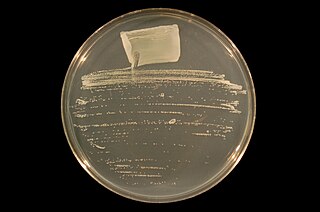
Rhizobium is a genus of Gram-negative soil bacteria that fix nitrogen. Rhizobium species form an endosymbiotic nitrogen-fixing association with roots of (primarily) legumes and other flowering plants.

Ensifer meliloti are an aerobic, Gram-negative, and diazotrophic species of bacteria. S. meliloti are motile and possess a cluster of peritrichous flagella. S. meliloti fix atmospheric nitrogen into ammonia for their legume symbionts, such as alfalfa. S. meliloti forms a symbiotic relationship with legumes from the genera Medicago, Melilotus and Trigonella, including the model legume Medicago truncatula. This symbiosis promotes the development of a plant organ, termed a root nodule. Because soil often contains a limited amount of nitrogen for plant use, the symbiotic relationship between S. meliloti and their legume hosts has agricultural applications. These techniques reduce the need for inorganic nitrogenous fertilizers.

Ensifer is a genus of nitrogen-fixing bacteria (rhizobia), three of which have been sequenced.
Ensifer fredii is a nitrogen fixing bacteria of the genus Sinorhizobium. It is a fast-growing root nodule bacteria. Sinorhizobium fredii exhibit a broad host-range and are able to nodulate both determinant hosts such as soy as well as indeterminate hosts including the pigeon pea. Because of their ease of host infection there is interest in their genetics and the symbiotic role in host infection and nodule formation.
Pararhizobium giardinii is a Gram negative root nodule bacteria. It forms nitrogen-fixing root nodules on legumes, being first isolated from those of Phaseolus vulgaris.
Mesorhizobium tianshanense, formerly known as Rhizobium tianshanense, is a Gram negative species of bacteria found in the root nodules of many plant species. Its type strain is A-1BS.
Bradyrhizobium canariense is a species of legume-root nodulating, endosymbiont nitrogen-fixing bacterium. It is acid-tolerant and nodulates endemic genistoid legumes from the Canary Islands. The type strain is BTA-1T.
Mesorhizobium plurifarium is a species of root nodule bacteria first isolated from Acacia species in Senegal. Its type strain is ORS 1032.
Rhizobium mongolense is a Gram negative root nodule bacteria, which nodulates and forms nitrogen-fixing symbioses with Medicago ruthenica. Its type strain is USDA 1844.
Neorhizobium huautlense is a Gram negative root nodule bacterium. It forms nitrogen-fixing root nodules on Sesbania herbacea.
Mesorhizobium ciceri is a gram-negative, nitrogen-fixing motile bacteria from the genus of Mesorhizobium which was isolated from Chickpea nodules of Cicer arietinum in Spain. Rhizobium cicero was transferred to Mesorhizobium ciceri.
Mesorhizobium mediterraneum is a bacterium from the genus Mesorhizobium, which was isolated from root nodule of the Chickpea in Spain. The species Rhizobium mediterraneum was subsequently transferred to Mesorhizobium mediterraneum. This species, along with many other closely related taxa, have been found to promote production of chickpea and other crops worldwide by forming symbiotic relationships.
Rhizobium lusitanum is a Gram negative root nodule bacteria, specifically nodulating Phaseolus vulgaris. Its type strain is P1-7T.
Ensifer americanus is a bacterium first isolated from root nodules of Acacia species native of Mexico. Its type strain is CFNEI 156.
Rhizobium bangladeshense is a gram-negative bacterium which was isolated from root nodules of lentils in Bangladesh.
Rhizobium binae is a gram-negative bacterium which was isolated from root nodules of lentils in Bangladesh.
Rhizobium lentis is a gram-negative bacterium which was isolated from root nodules of lentils in Bangladesh.
Rhizobium tropici is a root nodule bacterium.
Rhizobium etli is a Gram-negative root-nodule bacterium.

Esperanza Martínez-Romero is a researcher and head of the Genomic Ecology Program at the Center for Genomic Sciences (CCG) of the National Autonomous University of Mexico (UNAM) in Cuernavaca, Mexico. She was awarded the L'Oréal-UNESCO For Women in Science Award in 2020.



